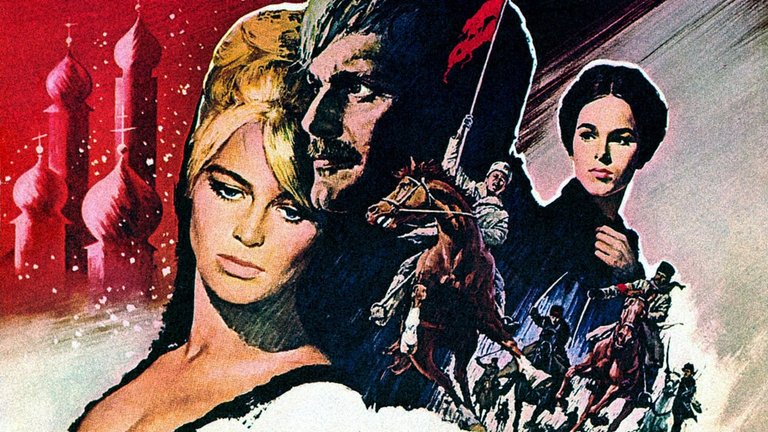Film Review: Doctor Zhivago (1965)

The 1960s marked a period of profound cultural transformation, with many Baby Boomers perceiving themselves as participants in a revolutionary epoch. This sentiment seemed to resonate with Doctor Zhivago, 1965 epic romantic drama, dealing with another revolution and becoming of the most iconic films of the era. However, when viewed through the lens of cinema history, Doctor Zhivago does not embody a revolutionary spirit; rather, it adheres to conventional Hollywood norms. The film represents an "old school," almost conservative approach to filmmaking, which mirrors its literary source—a novel that adopts an ambivalent stance towards revolution and its consequences.
The film is adapted from Boris Pasternak's eponymous 1957 novel, which faced significant challenges due to its content not aligning with Soviet ideology. Pasternak, a renowned Russian poet, had to smuggle his manuscript to Italy, where it became a bestseller. Its implied anti-Communist sentiments garnered widespread acclaim in Western nations and other countries outside Soviet control. This situation served as a propaganda boon for the West during the Cold War, culminating in Pasternak receiving the Nobel Prize for Literature—an award he was unable to accept in person due to Soviet restrictions. This incident has been described as one of the most embarrassing public relations blunders for the Soviet government, a sentiment later echoed by Soviet leader Nikita Khrushchev in his private writings.
Doctor Zhivago, much like its literary counterpart, draws inspiration from Pasternak's life. The titular character, Yuri Andreyevich Zhivago, portrayed by Omar Sharif, is a physician and poet whose experiences reflect those of Pasternak himself. The film opens with an intriguing narrative device: a prologue, set presumably after WW2, during which NKVD Lieutenant General Yevgraf Andreyevich Zhivago (played by Alec Guinness), Yuri's older half-brother, visits a dam and encounters Tanya Komarova (played by Rita Tushingham), whom he suspects may be Yuri's long-lost daughter with his muse Lara Antipova (played by Julie Christie). This encounter triggers a series of flashbacks that transport viewers to an earlier time when Russia was still under the oppressive Czarist regime.
The plot intricately weaves together the lives of Yuri and Lara amidst the chaos of war and revolution. Yuri, an orphan raised by foster parents, falls in love with Lara while married to Tonya Gromeko (played by Geraldine Chaplin). Lara's tumultuous life includes being involved with Victor Komarovsky (played by Rod Steiger), a morally dubious but politically connected lawyer who exploits political connections. Their lives are further complicated by Lara's relationship and marriage with Pavel "Pasha" Antipov (played by Tom Courtenay), a revolutionary who undergoes a disturbing transformation into “Strelnikov”, a ruthless Bolshevik commander during the civil war. As their paths intertwine amid the chaos and bloodshed of World War I and the Russian Revolution, Yuri and Lara's romance faces brutal interruptions from external forces.
David Lean directed Doctor Zhivago following his success with Lawrence of Arabia, another epic film set against historical events. Produced by Carlo Ponti and MGM, Doctor Zhivago delivered on audience expectations for grand Hollywood spectacles—offering breathtaking vistas filmed in Spain, Finland, and Canada that convincingly represented Russia's vastness and coldness. The film features meticulously crafted mass scenes and period details that enhance its authenticity. However, despite these visual triumphs, Lean's film has been critiqued for its artistic conservatism.
Critics were notably less enthusiastic about Doctor Zhivago than about Lean's previous works. While some criticisms may seem surprising given Lean's reputation as a cinematic master, they reveal valid concerns regarding both the film's execution and its source material. Screenwriter Robert Bolt accomplished the challenging task of condensing Pasternak's sprawling narrative into a format accessible to contemporary audiences. However, despite its epic length of nearly three and a half hours, significant elements appeared lacking. Bolt emphasised romance over complex political themes; consequently, Yuri emerges as an unusually passive character despite being described as a renowned poet—his poetic voice largely absent from the film.
Julie Christie delivers a compelling performance as Lara Antipova; her beauty and charisma contribute significantly to her character's appeal. Her chemistry with Sharif is palpable but often overshadowed by supporting characters who exhibit more depth and intrigue. Rod Steiger stands out as Komarovsky—a villainous yet intelligent figure who navigates shifting political landscapes while manipulating those around him. Tom Courtenay also excels as Pasha Antipov; his character’s all-too-familiar evolution from idealistic revolutionary to bloodthirsty fanatic is both poignant and tragic. Unfortunately, Courtenay’s storyline remains underexplored even within the film’s lengthy runtime.
Despite being one of the most expensive films produced at that time, Doctor Zhivago proved immensely successful at the box office—reflecting public demand for such grand narratives. Its popularity extended beyond financial success; it influenced cultural trends globally—evident in the surge of girls named "Lara" following its release.
However, despite its commercial achievements, this adaptation of Pasternak’s novel is not without flaws. It was reasonable to anticipate further adaptations; indeed, following Pasternak’s rehabilitation during Glasnost in 1990, his novel was adapted into Another Life, a modest television film produced through Soviet-British collaboration. In 2002, another British miniseries featuring Hans Matheson and Keira Knightley was released; subsequently, in 2005, Russian television aired an 11-part miniseries starring Oleg Menshikov and Chulpan Khamatova.
Doctor Zhivago is a film that has been both celebrated and criticized over the years, with a narrative that is both beautiful and brutal. While it is a conventional "old school" Hollywood epic, with a focus on romance and sweeping vistas, it also explores the complexities of revolutionary politics and the human cost of war. Despite its limitations, the film remains a masterpiece of cinematic storytelling, with a memorable score, stunning visuals, and a chemistry between its leads that is undeniable.
RATING: 7/10 (+++)
Blog in Croatian https://draxblog.com
Blog in English https://draxreview.wordpress.com/
InLeo blog https://inleo.io/@drax.leo
Hiveonboard: https://hiveonboard.com?ref=drax
InLeo: https://inleo.io/signup?referral=drax.leo
Rising Star game: https://www.risingstargame.com?referrer=drax
1Inch: https://1inch.exchange/#/r/0x83823d8CCB74F828148258BB4457642124b1328e
BTC donations: 1EWxiMiP6iiG9rger3NuUSd6HByaxQWafG
ETH donations: 0xB305F144323b99e6f8b1d66f5D7DE78B498C32A7
BCH donations: qpvxw0jax79lhmvlgcldkzpqanf03r9cjv8y6gtmk9
Posted Using INLEO
One of the film that Jimmy McGill loves the most. A classic impressive enough.